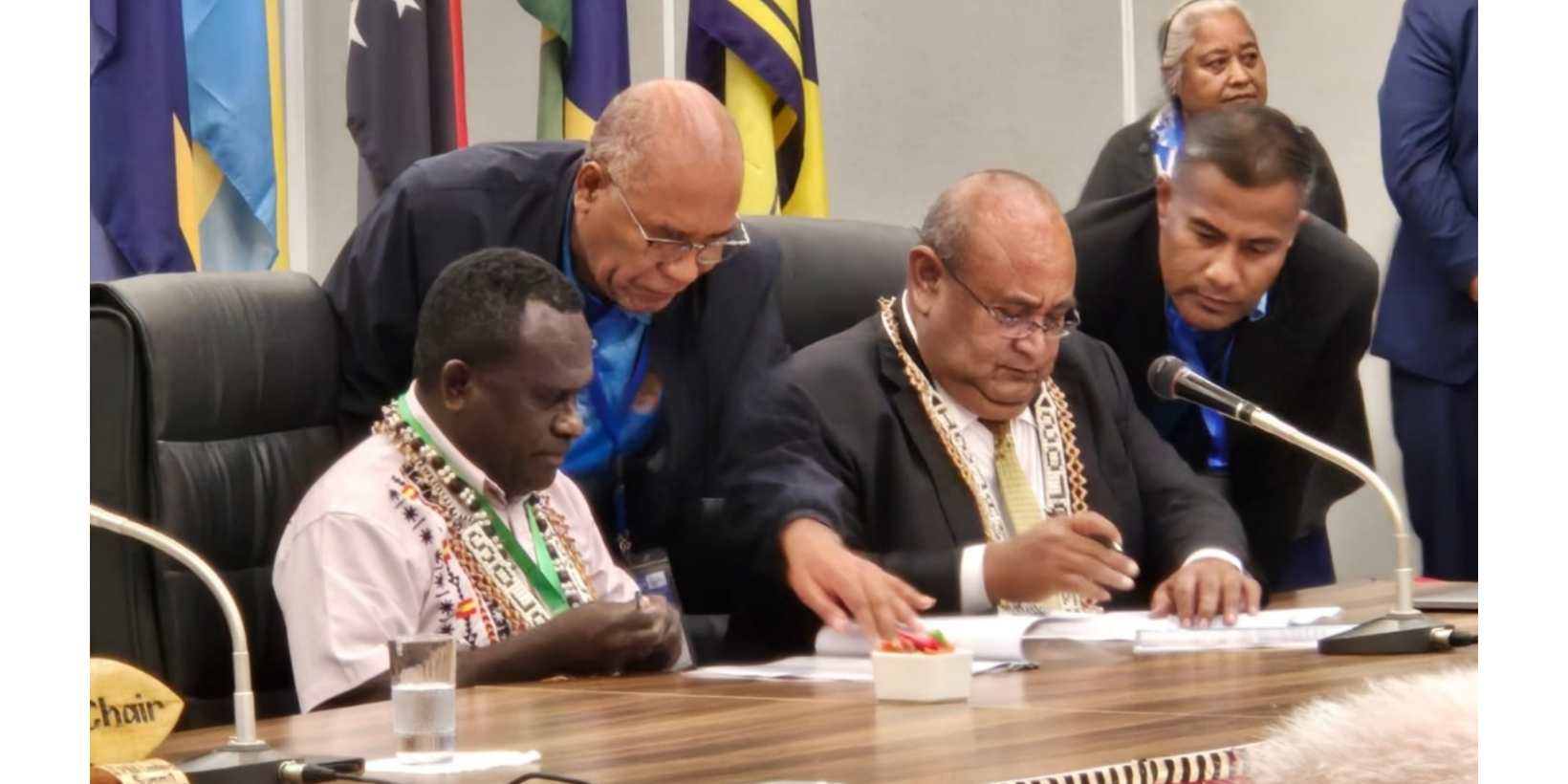A memorandum of understanding (MOU) by Solomon Islands’ Deputy Prime Minister, the Hon. Frederick Kologeto, and Kiribati’s Minister for Fisheries and Ocean Resources, Hon. Ribanataake Tiwau took place during the plenary session of the Fourth Party to the Nauru Agreement Leaders’ Summit in Funafuti, Tuvalu last week.
The understanding establishes a commitment to collaborate on the development of the Bina Harbour tuna processing plant, a flagship project in Malaita Province, Solomon Islands, designed to create jobs, enhance food security, and secure greater value from tuna resources.
The understanding will ensure a sustainable supply of tuna for the plant from the two countries. It will facilitate Kiribati’s participation in the project and give real effect to the hub-and-spoke model framed in the regional East New Britain Initiative. In this case, Solomon Islands will be the processing hub and Kiribati a supply spoke.
Access to Kiribati’s exclusive economic zone for vessels supplying the Bina Harbour plant will mitigate Solomon Islands’ risk of its tuna abundance migrating to the east due to climate change.
At the same time, a commercial interest in the Bina Harbour plant, as anticipated under this MOU, will enable Kiribati to capture more value from its tuna through processing at Bina Harbour and gain economic benefits and future employment opportunities.
Kiribati faces challenges in establishing industrial-scale tuna processing within its territory due to the scarcity of land and fresh water required.
Deputy Prime Minister Kologeto said, “This is how we PNA countries can pool our strengths, share opportunities, and exert full control of our tuna fisheries for the economic and social benefit of our people.”
Kiribati’s Minister Tiwau said, “If you can dream it, you can do it”, underlining the significance of moving to tuna value chain retention for the greater benefit of the parties, as referred to in the PNA framework and a key theme of the Fourth Leaders’ Summit.
After the signing, Dr Christain Ramofafia, Permanent Secretary of Solomon Islands’ Ministry of Fisheries and Marine Resources, invited other PNA countries to join the Bina Harbour project, saying: “This MOU is about PNA solidarity, as Solomon Islands and Kiribati join hands to drive the Bina Harbour project, strengthen regional tuna supply chains, and ensure our people capture more from our fisheries.”
In response, Secretary Abeta of Kiribati’s Ministry of Fisheries and Ocean Resources said, “Kiribati acknowledges the Solomon Islands for their invitation to partner with them in this exciting project. This is a true testament of mutual trust and a strong relationship between our peoples and Governments”.
The Leaders’ Summit ran from 1-4 September, with leaders and officials from all nine Parties to the Nauru Agreement participating.
The Bina Harbour Tuna Processing Plant Project is a Solomon Islands Government initiative led by the MFMR. The New Zealand Government funds the Bina Harbour Project Office to support MFMR in project planning and coordination.
Bina Harbour is a natural harbour in Malaita Province, where, under a public-private partnership arrangement, the Government will establish an international-class wharf and other infrastructure to support a tuna processing export operation set up and operated by a private investor.
- BINA HABOUR PROJECT/MFMR
Photo caption: Solomon Islands Deputy Prime Minister Frederick Kologeto and Kiribati’s Minister for Fisheries and Ocean Resources, Hon Ribwanataake Tiwau sign the MOU, flanked by Dr Christain Ramofafia, Solomon Islands’ Permanent Secretary, MFMR, and Riibeta Abeta, Kiribati’s Secretary, MFOR.









